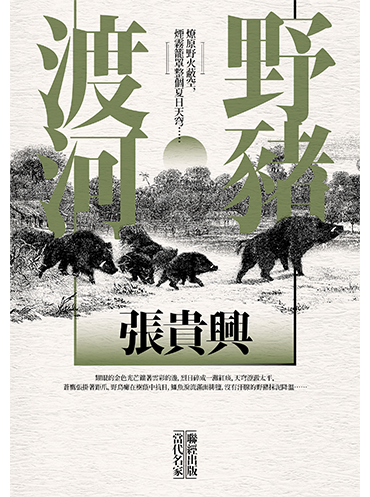* 2019 Taiwan Literature Award
* 2019 Golden Tripod Award
* 2019 Taipei Book Fair Award
* 2018 Openbook Award
* 2018 Books.tw Recommended Title
A dramatic tale of beauty and brutality unfolds in the fictional town of Boarfruit Village on Borneo’s north coast in the early days of World War II. The Japanese imperial invasion of Sarawak unfolds in a whirlpool of human torment, love, and desperation like a wildfire in the jungle.
Nine days after the attack on Pearl Harbor, ten thousand Japanese imperial troops landed on the beaches of Sarawak, on the northern coast of Borneo. They would occupy the region for three years and eight months, during which time they attempted to cleanse all opposition through fire and blood. That story, and the human stories beneath that greater narrative, unfold in Zhang Guixing’s fictional town of Boarfruit Village like a wildfire burning through the jungle.
The tale begins when the shadows of bloodshed return to one of Boarfruit Village’s silent heroes, Guan Yafeng, years after the war. At twenty-one, Guan sacrificed both arms to the struggle against the Japanese; instead of succumbing to his handicap, he learned to use feet to do what most people can’t even accomplish with their hands. But his son’s discovery of a chest of masks and toys drives this indomitable hunter, handyman, and guerilla into a such a deep psychosis that he hangs himself by the jackfruit tree in his garden.
Guan Yafeng’s death brings us back to the first days of occupation, when Japanese commander Kawaguchi Kiyotake lands his forces on the beach by the village. Kiyotake moves against a partisan resistance led by Chinese Borneans with swift and brutal repression measures that do not spare civilians. No matter where fighters and villagers run to, they are always found out. Could there be a traitor in their midst?
Zhang Guixing’s novel invokes the black soul of colonial history through the language of magic and metaphor. Zhang’s fictional village, based on his father’s home town on the Bornean coast, thrums with the constant movement and diversity of life so characteristic of true rural environments. Its many inhabitants move through and against the tide of colonial impression in whatever way they can, yet the imprint of trauma never leaves them.
